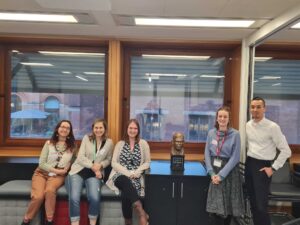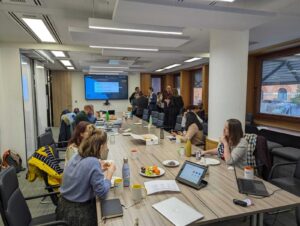On November 30th, the Alan Turing Institute hosted the second meeting of the Turing Special Interest Group (SIG) on Novel Data Linkages for Health and Wellbeing, organised by Anya Skatova (University of Bristol) and Michelle Morris (University of Leeds). The primary aim of the group is to explore opportunities and challenges in linking digital footprint data to health and wellbeing. Following the success of the inaugural event in October 2022, this second event gathered around 40 attendees, in a hybrid format, representing diverse backgrounds in academia, industry, and government. The event was supported by Early Career Researchers from the University of Bristol who facilitated interactive discussion groups (Neo Poon), and took notes to capture key insights (Romana Burgess, Poppy Taylor, Francesca Moore).

The day began with an engaging talk from John Stuart, founder of Fuell Limited, who discussed the challenges of sharing consumer data, highlighting the crucial role of transparency in building trust with consumers and partners. John emphasised the positive impact of collaborations with esteemed institutions like the Leeds Institute of Data Analytics (LIDA), and highlighted the need for a streamlined process for data sharing between industry and universities.
Next came a talk from Phil Waywell, Director of Digital Partnerships, provided valuable insights into harnessing digital footprint data for a deeper understanding of broader health issues. Phil explained the evolving procedures for accessing NHS data through Secure Data Environments (SDEs) – emphasising a transition from data sharing to data accessing – and highlighted the importance of bidirectional engagement with public, patients, and practitioners.
The talks were followed by a dynamic feedback session from industry participants, highlighting key incentives for collaboration with universities, such as the ability to work toward non-commercial goals, while also addressing challenges like the preference for competitive research to take place in-house.

This fed into the final session of the day, breaking into three discussion groups led by Anya, Michelle, and Neo to further explore the incentives and challenges of collaboration between businesses, policymakers, and universities. Michelle’s group discussed concerns relating to Intellectual Property and ownership of outputs, and highlighted government reluctance to share data due to security and GDPR complexities. Neo’s group explored data providers’ concerns about research teams’ technical proficiency and secure data handling, leading to conversations about training and funding; they also touched on industry partners’ preference for project-specific data sharing over public repositories, even with fully anonymous and restricted access. Finally, Anya’s group identified significant barriers to collaboration, including contradictions in data policies, challenges in data sharing policies (particularly in sectors like banking), and the necessity for senior-level buy-in; they suggested potential solutions, like funding positions within industry partners, and raising the profiles of data scientists within organisations.
Overall, the event was extremely successful, facilitating fruitful discussions and meaningful conversations between diverse groups. A summary report of the main points and insights from the session will follow soon.
The SIG is open to anybody working in the field of novel data or novel data linkages, so if you are interested to join the mailing list for the updates from the SIG, please sign up here. For any questions about the group please contact Anya.
By Romana Burgess